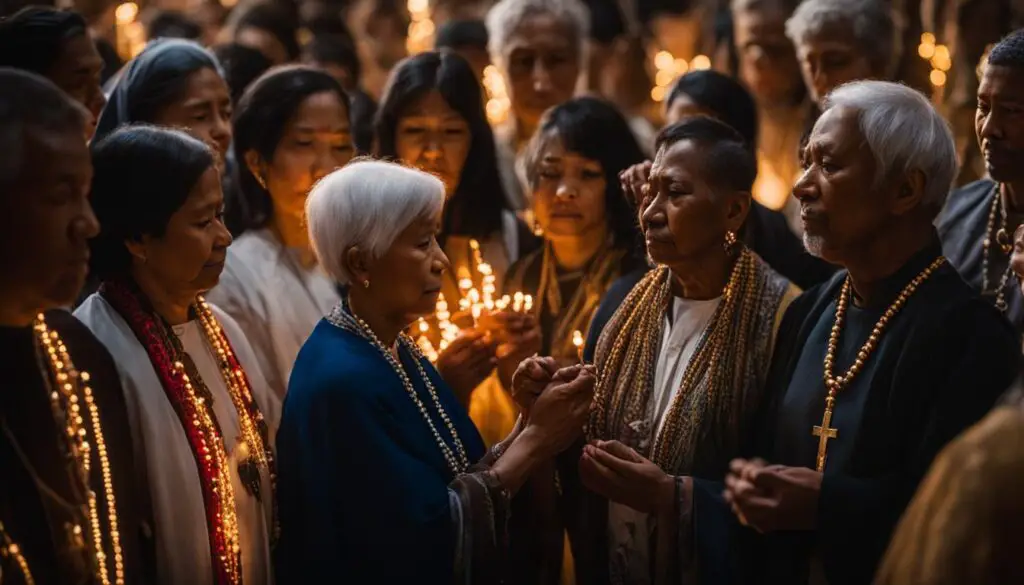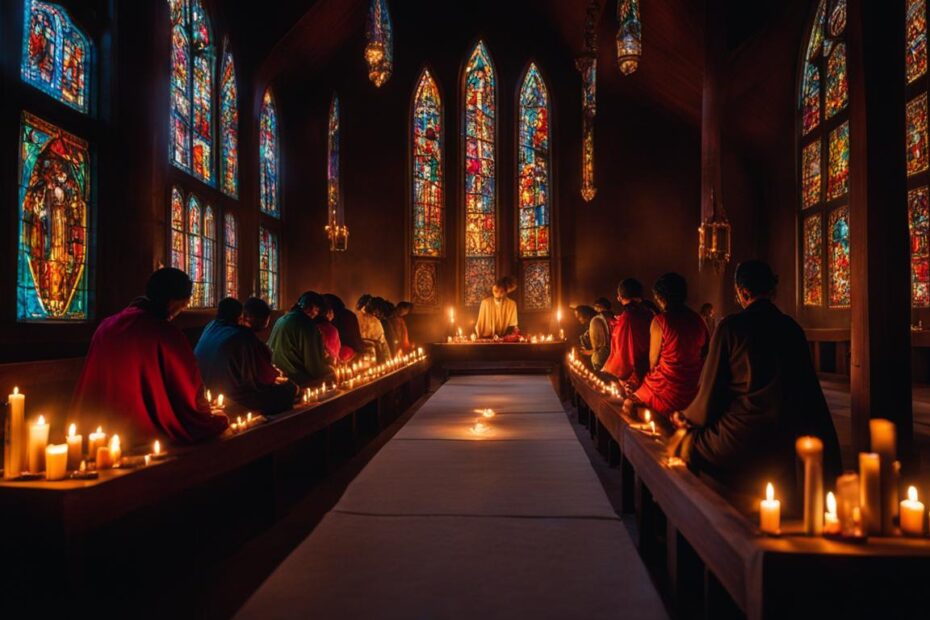Prayers of tradition, deeply rooted in religious traditions, have a profound impact on personal spirituality and collective faith in the United States. Passed down through generations, these prayers encompass a wide range of prayer rituals, cultural prayers, ancestral prayers, traditional prayer practices, historical prayers, and traditional prayer ceremonies. They connect individuals to their heritage and provide a sense of continuity with the past.
Key Takeaways:
- Prayers of tradition are deeply rooted in religious traditions and have a profound impact on personal spirituality and collective faith.
- These prayers encompass a wide range of rituals, practices, and ceremonies that connect individuals to their heritage.
- Prayers of tradition provide a sense of continuity with the past, allowing for a deeper understanding of one’s religious identity.
- Exploring the beauty of prayers of tradition offers opportunities for personal growth and spiritual connection.
- By participating in traditional prayers, individuals can strengthen their faith and foster a sense of community.
Understanding the Different Forms of Traditional Prayer
In the realm of traditional prayer, there exists a diverse array of rituals, practices, and customs that are deeply ingrained in religious traditions. These various forms of prayer allow individuals to connect with their spirituality and express their devotion in unique ways. Let us explore some of the key forms of traditional prayer:
1. Intercession:
Intercession prayers involve lifting up supplications on behalf of others. This act of selflessness demonstrates the belief in Christ’s mediatory role and highlights the commitment to care for one another in times of need.
2. Thanksgiving:
Thanksgiving prayers emphasize the importance of expressing gratitude to the divine, even during challenging times. It is a way to acknowledge and appreciate the blessings received, cultivating a spirit of thankfulness in the midst of adversity.
3. Blessing, Adoration, and Petition:
These forms of prayer focus on responding to God’s blessings, offering adoration and praise, and presenting heartfelt requests. Through blessing, adoration, and petition, individuals express their hopes, dreams, and desires, seeking guidance and intervention from the divine.
These different forms of prayer are woven into the fabric of traditional prayer practices, enabling individuals to engage with their spirituality in a meaningful and personal way. Each form carries its own significance and purpose, fostering a deeper connection with the divine.
| Forms of Traditional Prayer | Definition |
|---|---|
| Intercession | Lifting up supplications on behalf of others. |
| Thanksgiving | Expressing gratitude to the divine, even during challenging times. |
| Blessing, Adoration, and Petition | Responding to God’s blessings, offering adoration and praise, and presenting heartfelt requests. |
Understanding the different forms of traditional prayer enables individuals to deepen their spiritual journey, fostering a stronger connection with their religious heritage. Through the richness of these prayer practices, one can find guidance, solace, and a profound sense of belonging within their faith community.
All Souls’ Day: Honoring the Departed Through Prayer
All Souls’ Day, observed on November 2nd, is a sacred time for Catholics to remember and pray for their departed loved ones. This cherished tradition allows individuals to honor the memory of the deceased and offer prayers for their souls. The central aspect of All Souls’ Day is the act of praying for the departed, a way to provide support and comfort to the grieving and express hope for their eternal peace. This day is also an opportunity for reflection on the lives of loved ones, sharing stories and memories to keep their memory alive. Additionally, offering support to those who are grieving and giving memorial gifts serve as meaningful gestures to honor the departed.
On All Souls’ Day, Catholics gather in churches to attend special Masses and services focused on prayers for the departed. It is a time to remember the souls in purgatory and offer supplications for their release from any remaining temporal punishments. Through these prayers, Catholics seek God’s mercy and grace for their loved ones, asking for their souls to find peace and salvation. All Souls’ Day is a way for believers to demonstrate their love and care for those who have passed away, acknowledging their continued presence in their lives.
Memorial gifts are also a significant part of All Souls’ Day. These gifts can take various forms, such as candles, flowers, or donations made in the name of the departed. Lighting candles and placing them at the gravesites or in churches symbolizes the eternal light of Christ and serves as a reminder of the ongoing spiritual connection between the living and the deceased. The act of giving memorial gifts expresses gratitude for the impact the departed had on their loved ones’ lives and serves as a tribute to their memory.
Prayers for All Souls’ Day
During All Souls’ Day, specific prayers are recited to honor the departed. One such prayer is the “Eternal Rest” prayer:
Eternal rest grant unto them, O Lord, and let perpetual light shine upon them. May the souls of all the faithful departed, through the mercy of God, rest in peace. Amen.
This prayer is a plea for God’s mercy and eternal peace for the souls of the departed. It is a heartfelt expression of love and hope for their salvation. Catholics also engage in personal prayers and reflection, offering their own intentions for the souls of their loved ones.
All Souls’ Day is a time of remembrance, prayer, and hope. It allows Catholics to connect with their departed loved ones, offering support, and expressing a desire for their eternal well-being. Through prayers and memorial gifts, believers honor the legacy of the departed and keep their memory alive within their hearts.
The Power of the Rosary in Tradition and Contemplation
The Rosary, an age-old prayer beloved by countless saints and encouraged by the Magisterium, holds a prominent place in the tradition of prayer. Its enduring popularity stems from its ability to combine simplicity and depth, making it a compendium of the Gospel message. The practice of the Rosary not only complements the Liturgy but also sustains and enriches it, providing a means of contemplation for the Christian faithful.
The Rosary holds immense power and significance in times of contemplation. It serves as a spiritual pathway for individuals to contemplate the face of Christ and experience the depths of His love. Through the repetition of the Hail Mary and meditation on the mysteries of the Rosary, believers can enter into a deeper connection with God, allowing His peace to flow into their hearts and minds. This contemplative aspect of the Rosary enables individuals to find solace, clarity, and strength in their spiritual journey.
“The Rosary is a powerful means of praying for peace and the well-being of families. It allows individuals to offer their supplications for peace, especially in regions of conflict, and serves as a means of deepening devotion to the family.” – Pope Francis
The Rosary for Peace and the Family
One of the most significant aspects of the Rosary is its capacity to inspire prayers for peace. In a world often marked by conflict and division, the Rosary provides a pathway for individuals of all backgrounds to unite in fervent supplication for peace. Whether it is peace within oneself, peace within families, or peace in the world, the Rosary allows believers to lift their intentions to God and trust in His transformative power.
Additionally, the Rosary holds a special place in nurturing devotion to the family. As Pope Francis states, it serves as a means of deepening devotion to the family. Through the meditative rhythm of the Rosary, families can come together to pray, seeking God’s guidance, protection, and blessings upon their loved ones. The Rosary’s focus on the Holy Family provides inspiration and a model for building strong family bonds, rooted in faith and love.
| Keyword | Description |
|---|---|
| Rosary | A prayer loved by countless saints and encourages contemplation. |
| Contemplative Prayer | The practice of deep reflection and connection with God. |
| Prayer for Peace | Seeking divine intervention and guidance for peace in various contexts. |
| Prayer for the Family | Prayers for the protection, guidance, and well-being of families. |
Reviving the Rosary in Modern Times
In light of the current historical and theological context, there is a pressing need to revive the practice of the Rosary. Some may question its relevance or consider it unecumenical due to its Marian character. However, the Rosary is a prayer that complements the liturgy and contributes to ecumenism, as it centers on the person of Christ. It is a powerful means of fostering contemplation and developing a genuine life of prayer.
Amidst the busyness and distractions of modern life, the revival of the Rosary offers a valuable opportunity to prioritize contemplation and silence. In a world that often seeks instant gratification, the commitment to contemplation through the Rosary cultivates a deeper prayer life and spiritual growth. By meditating on the mysteries of the Rosary, individuals enter into a profound dialogue with God, seeking His guidance, peace, and presence.
The Rosary is not simply a recitation of prayers; it is a school of prayer, a way of learning to converse with God in the quiet recesses of our hearts, and a pathway to a more intimate relationship with Him.
The revival of the Rosary can contribute to the formation of authentic “schools of prayer” within Christian communities, where individuals can come together to learn, share, and grow in their understanding and practice of prayer. These schools of prayer provide guidance, support, and accountability, creating an environment that encourages a consistent and committed prayer life. Through the revival of the Rosary, individuals can discover the transformative power of prayer, experiencing a deeper connection with God and finding solace, strength, and peace in their spiritual journey.
Table: Comparing Prayer Practices
| Prayer Practice | Focus | Benefits |
|---|---|---|
| Traditional Prayer | Rooted in religious traditions | Provides a sense of continuity and connection with heritage |
| Contemplative Prayer | Deepening relationship with God | Fosters inner peace and spiritual growth |
| Community Prayer | Shared faith experience | Strengthens communal bonds and collective worship |

The revival of the Rosary is much more than a simple return to an ancient prayer practice; it is a call to embrace a commitment to contemplation and a school of prayer. As individuals rediscover the beauty and power of the Rosary, they develop a greater sense of reverence, deepening their connection to God and fostering a vibrant prayer life. The revival of the Rosary in modern times offers a transformative pathway to spiritual growth, providing solace, peace, and guidance in an increasingly chaotic world.
Conclusion
The prayers of tradition, such as the Rosary, hold a significant place in personal and collective spirituality. These prayers connect individuals to their religious heritage, providing a sense of continuity and reverence.
The practice of the Rosary, in particular, offers a path of contemplation and serves as a powerful tool for personal reflection, praying for peace, and nurturing a vibrant prayer life. The beauty of the Rosary lies in its ability to guide us through the mysteries of Christ’s life, allowing us to meditate on His love, sacrifice, and resurrection.
As we embrace the richness of prayers of tradition, let us praise the Rosary for its profound impact on the faithful. Through its revival, we can recommit ourselves to a prayerful life, deepening our relationship with God and experiencing the transformative power of prayer. May the Rosary continue to be a source of strength, comfort, and inspiration as we journey on the path of faith.
FAQ
What are prayers of tradition?
Prayers of tradition are prayers that have been passed down through generations and are deeply rooted in religious traditions. They encompass a wide range of prayer rituals, cultural prayers, ancestral prayers, traditional prayer practices, historical prayers, and traditional prayer ceremonies.
What are the different forms of traditional prayer?
Traditional prayer can take on various forms, including intercession, thanksgiving, blessing, adoration, and petition. Each form has its own significance and purpose, allowing individuals to express a range of emotions and intentions in their prayers.
What is the significance of All Souls’ Day?
All Souls’ Day, observed on November 2nd, is a sacred time for Catholics to remember and pray for their departed loved ones. It is an opportunity to honor their memory, offer prayers for their souls, and reflect on their lives through sharing stories and memories.
What role does the Rosary play in traditional prayer?
The Rosary holds a prominent place in the tradition of prayer. It is a Christocentric prayer that combines simplicity and depth, serving as a compendium of the Gospel message. The Rosary allows individuals to contemplate the face of Christ, experience His love, and pray for peace and the well-being of families.
Why is there a need to revive the practice of the Rosary?
In light of the current historical and theological context, there is a pressing need to revive the practice of the Rosary. Despite potential concerns about its relevance or ecumenical nature, the Rosary complements the liturgy, contributes to ecumenism, and fosters contemplation and a genuine life of prayer.
What is the importance of prayers of tradition?
Prayers of tradition hold a significant place in personal and collective spirituality. They connect individuals to their religious heritage, provide a sense of continuity and reverence, and guide them on their spiritual journey. They deepen faith, nurture a vibrant prayer life, and allow individuals to experience the transformative power of prayer.








